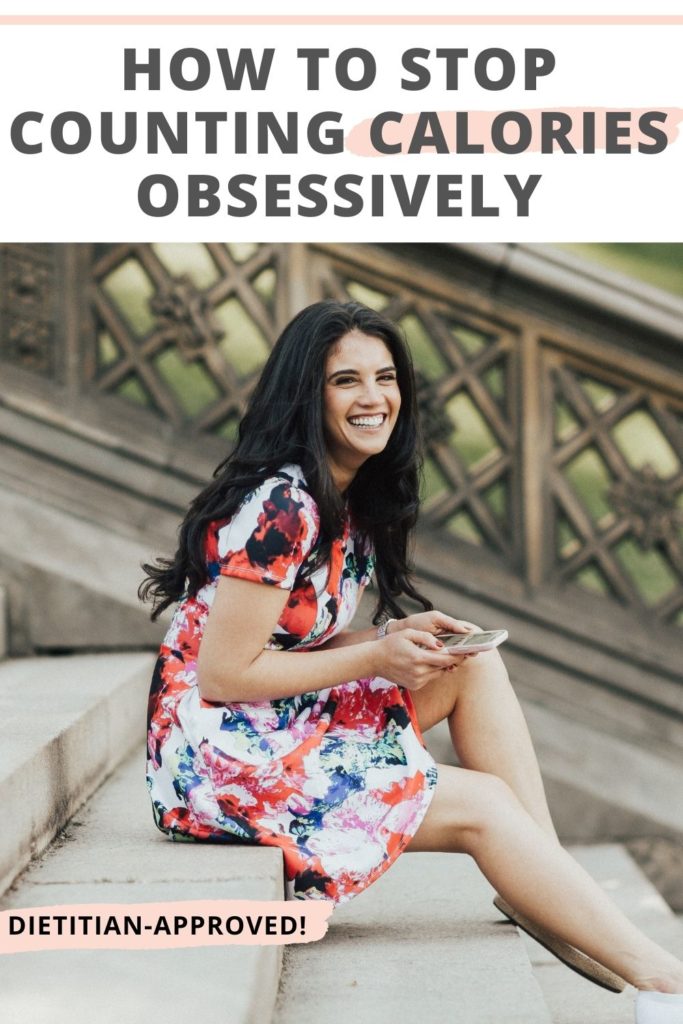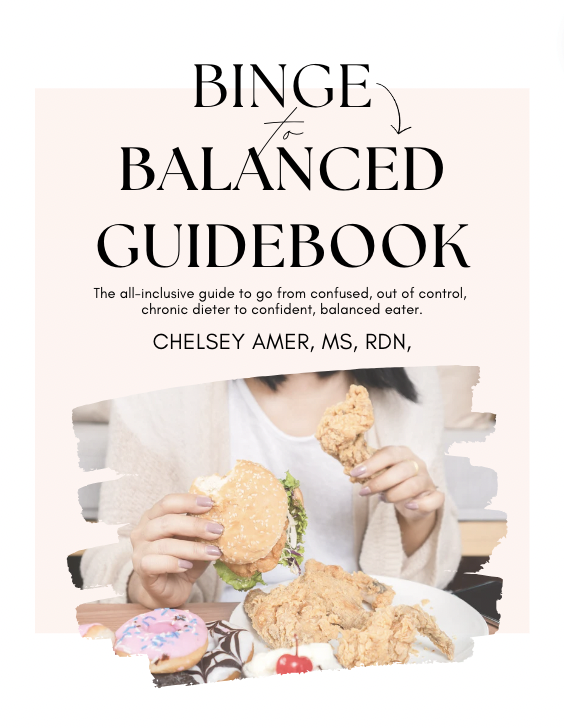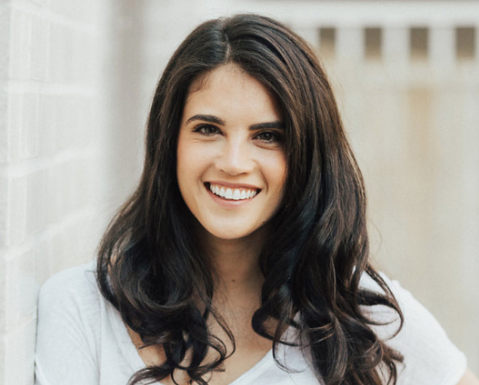How to Stop Counting Calories Obsessively (& what to do instead!)
In this blog I’m going to share how to stop counting calories obsessively and what you should do instead to feel good from the food you eat, improve your relationship with food, and take math out of your eating equation. It takes time to trust your body, but you can do it!

Are you a calorie counter?
I’ve been able to tell you the exact number of calories in a wide variety of foods long before I became a registered dietitian. In fact, I’m pretty sure my calorie counting food journals date back to high school.
I used to log everything I ate in a marble notebook, keeping the number as low as possible… or at least below 1,200 calories. Because that’s what I read in “health” magazines. To be fair, that’s what science knew at the time.
Luckily, I was never consistent (because my body was screaming for more food and I don’t like to be hungry), but I would go “on ” and “off” my calorie counting sprees. Wow I don’t think I ever shared that before.
I never had an eating disorder, but I definitely exhibited signs of disordered eating… and it started with counting calories.
That’s why I am not a fan of calorie counting and why today we’re chatting about how to stop counting calories obsessively!
But let me say… there’s nothing wrong with calorie counting if it works for you.
If you don’t have obsessive thoughts about every bite of food you eat…
If you don’t worry about exceeding your calorie goal if you’re still hungry…
If the number of calories you eat doesn’t influence your mood…
Calorie counting to manage your weight may work for you.
Many studies show that calorie counting is an effective way to lose weight. That’s right, it may work while you’re actively counting calories for the short-term.
But calorie counting doesn’t always work! Here’s how to stop counting calories…
What these studies neglect to share is that most dieters or calorie counters will GAIN BACK WEIGHT LOST, even if they continue to eat in this caloric deficit. Because your body is smarter than you think!
There are two mechanisms that will “make up” for any caloric deficit that you create:
- Your metabolism slows to accommodate less energy.
- Your hormones shift to encourage eating.
First, your metabolism changes over time, so your caloric deficit must change over time too to continue losing weight. But you can only eat so little!
Here’s the back story: essentially, when you restrict your calories, your body lowers its resting metabolic rate (RMR) to accommodate less energy (AKA calories). This is one reason dieters reach weight loss plateaus.
Eventually your caloric deficit will catch up to your lowered metabolism, and you’ll need to restrict your calories even further. The problem is that your body cannot run on so few calories in the long-term, so eventually your drive to eat will win for the health and benefit of your body.
Second, dieting leads to a shift in your hormones to stimulate your appetite. Even after a YEAR of dieting, your hormonal drive to eat will win.
Plus, what does calorie counting teach you about nutrition? Or listening to your body’s inner hunger and fullness cues?
Zilch. Nada. Nothing!
That’s why I’m not a fan of calorie counting to lose weight.
Let me tell you about a client who loved calorie counting…
My client, let’s call her Patricia (name changed), LOVED calorie counting when we first started working together. She couldn’t get over the fact that she knew the calorie counts for nearly every food out there. Honestly, even as a registered dietitian I’m pretty sure she knew more calorie counts than I did!
Patricia would eat as low calorie as possible all day long, just in case she had a moment of “weakness” later and wanted a “splurge food.” The problem with doing this is that she ALWAYS had an enormous binge in the afternoon and would sometimes exceed her allotted calorie count.
Why?
It’s science… when you don’t feed your body adequate energy (aka CALORIES), it will go into overdrive to get them. This usually turns into you overeating high fat and high sugar foods so your body gets the energy that it needs.
Sound familiar? Get the Binge to Balanced Guidebook to learn how to stop binging and start eating in a balanced way, without eliminating any foods!
First, Patricia and I worked on eating more consistently throughout the day. By fueling her body with energy evenly throughout the day, when she was hungry, she was able to prevent these afternoon and evening binges.
Patricia also had the habit of feeling GUILTY if she exceeded her daily calorie budget.
Next, we worked on Patricia’s relationship with food. Without assigning moral value to foods, Patricia was able to choose the foods she wanted to eat, without getting “out of control.”
She no longer felt guilty if she enjoyed pizza and wine for dinner and went over her daily calorie budget.
Instead, she learned to trust her body would even out and eat the number of calories that she needed.
Let this be a lesson for you…
You don’t need to turn your food intake into a mathematical equation.
Instead, you can learn to trust your body and eating according to your hunger and fullness cues.
But I get that’s a big leap of many of you who may be calorie counters. And possibly calorie counters for YEARS.
It’s hard to stop calorie counting if it’s all you know. But slowly you can drift away from counting every morsel of food you eat (and think about the TIME you’ll get back!).
Remember: you can stop dieting and lose weight.
But also, your weight may not change. Or it may increase. Or increase at first. And that’s OK too!
Your body knows where it’s meant to be. The weight that you effortlessly maintain without micromanaging your food or exercise.
Here’s how to stop counting calories obsessively:
If you’ve been counting calories for years, like my client Patricia, it may take some time for you to “forget” the caloric value of foods. It’s 100% normal for you to continue to think about calories, so don’t think you’re “doing it wrong.”
While you’re trying to forget, here are a few steps to take to break up with calorie counting…
Step 1: Delete or throw away your calorie counting mechanism.
Whether you delete My Fitness Pal or Lose It! from your phone or throw away your marble notebook (just me?), it’s time to ditch your calorie counting mechanism.
This shows yourself that you’re ready to break up with math and eating.
Also, by no longer having the number or your “calorie countdown” in front of you, you will be able to eat what you want and feel more satisfied from your food. Remember, satisfaction is KEY!
Step 2: Get in touch with your inner hunger cues.
The best time to eat for the most satisfaction from your food is when you’re actually hungry.
If you begin to notice your physical signs of hunger and HONOR THEM, your body will begin to trust you back.
As a result, it’s easier to stop eating when you’re full. Honoring your hunger and fullness will help you eat the number of calories your body needs… not what you *think* you should be eating.
If it’s hard for you to get in touch with your hunger and fullness cues, you’re not alone. It takes time. Be patient with yourself and ask for help! This is something I cover extensively with 1:1 clients and in the Nutrition Training Program.
Step 3: Think about WHAT you want to eat… regardless of the caloric count you know in the back of your head.
I know you know the number of calories in that donut. Or slice of pizza. Or tacos. (Eventually you’ll forget, I promise!)
But regardless of what you *think* the number is, try to identify what you’re actually in the mood for.
When you make food choices based on SATISFACTION, you’ll actually eat less. Perhaps not at first because these higher calorie foods were “off limits,” but over time you will need less to be satisfied. It’s kinda cool how that works!
Unsure how to stop counting calories? Don’t be afraid to ask for help!
Working with a registered dietitian without a numerical focus can help you heal your relationship with food and get in touch with your body’s needs.
Believe it or not, just because My Fitness Pal says you need 1,500 calories, some days you may need more and some days you may need less.
If you’re ready to listen to your body and stop calorie counting for good, reach out, I’d love to help!
XO



 Hi there!
Thanks for stopping by! I'm Chelsey, an online Registered Dietitian, recipe developer, budding photographer, and coffee addict! My mission is to help you feel good through food by answering the question "What should I eat?" Let's make nutrition approachable!
I hope you enjoy my personal collection of simple, healthy, food allergy friendly and nutritiously delicious recipes, plus tips and tons of tricks that will help YOU live a nutritionally-balanced life! I look forward to getting to know you better...
Hi there!
Thanks for stopping by! I'm Chelsey, an online Registered Dietitian, recipe developer, budding photographer, and coffee addict! My mission is to help you feel good through food by answering the question "What should I eat?" Let's make nutrition approachable!
I hope you enjoy my personal collection of simple, healthy, food allergy friendly and nutritiously delicious recipes, plus tips and tons of tricks that will help YOU live a nutritionally-balanced life! I look forward to getting to know you better...







